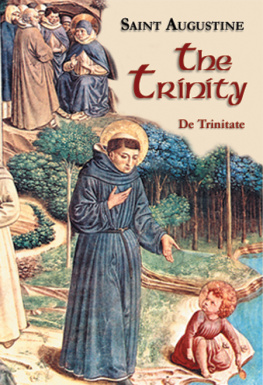J. K. Huysmans - Saint Lydwine of Schiedam: 1380-1433
Here you can read online J. K. Huysmans - Saint Lydwine of Schiedam: 1380-1433 full text of the book (entire story) in english for free. Download pdf and epub, get meaning, cover and reviews about this ebook. year: 2016, publisher: TAN Books, genre: Religion. Description of the work, (preface) as well as reviews are available. Best literature library LitArk.com created for fans of good reading and offers a wide selection of genres:
Romance novel
Science fiction
Adventure
Detective
Science
History
Home and family
Prose
Art
Politics
Computer
Non-fiction
Religion
Business
Children
Humor
Choose a favorite category and find really read worthwhile books. Enjoy immersion in the world of imagination, feel the emotions of the characters or learn something new for yourself, make an fascinating discovery.

- Book:Saint Lydwine of Schiedam: 1380-1433
- Author:
- Publisher:TAN Books
- Genre:
- Year:2016
- Rating:4 / 5
- Favourites:Add to favourites
- Your mark:
- 80
- 1
- 2
- 3
- 4
- 5
Saint Lydwine of Schiedam: 1380-1433: summary, description and annotation
We offer to read an annotation, description, summary or preface (depends on what the author of the book "Saint Lydwine of Schiedam: 1380-1433" wrote himself). If you haven't found the necessary information about the book — write in the comments, we will try to find it.
Saint Lydwine of Schiedam: 1380-1433 — read online for free the complete book (whole text) full work
Below is the text of the book, divided by pages. System saving the place of the last page read, allows you to conveniently read the book "Saint Lydwine of Schiedam: 1380-1433" online for free, without having to search again every time where you left off. Put a bookmark, and you can go to the page where you finished reading at any time.
Font size:
Interval:
Bookmark:
SAINT LYDWINE
OF
SCHIEDAM
By
J.-K. HUYSMANS
Translated from the French by AGNES HASTINGS
NIHIL OBSTAT:
G. H. Joyce, S. J.
Censor Deputatus
IMPRIMATUR:
Edm. Can. Surmont
Vic. Gen. Westmonasterii
die 30 Novembris, 1922
Originally published in 1923 by Kegan Paul,
Trench, Trubner & Co., Ltd., London. Reprinted by arrangement with the original publisher.
Library of Congress Catalog Card Number:
79-87551
ISBN: 0-89555-087-3
TAN Books
Charlotte, North Carolina
www.TANBooks.com
1979
Deus carni illius spe dolores infligit, quatenus Spiritus Sanctus ibi habitare possit.
Sancta Hildegardis, Vita, lib.ii.
PREFACE
THE life of St. Lydwine has been written by three men of religion who were her contemporaries.
Jan Gerlac, a relation of hers, was sacristan of the Augustine monastery of Windesem. He lived many years near the Saint, even in the same house, and he tells of her daily life from observation.
Jan Brugman was a lay brother of the "Observance." He took up the work of Gerlac, translating it into Latin and amplifying it with details supplied him by Jan Walter de Leyde, the last Confessor of Lydwine.
Thomas Kempis was sub-prior of the Augustinians of Mount St. Agnes near Zwolle. His relation is abridged from that of Brugman, but adds details gathered at Schiedam from those who knew the Saint.
Jan Gerlac had some fame as a writer, and his "Soliloquies" are still sought for. He was, according to his contemporaries, a very fervent and a very humble monk; and Jan Brugman, a friend of Denys de Chartreux, is quoted by Wading in the Annals of his order, as one of the celebrated preachers of his century; admirable both for the elevation of his eloquence and for the number of his virtues. Thomas Kempis, one of the presumed authors of the "Imitation of Christ," was born the same year as Lydwine and died, in the odour of sanctity, in 1471, after having written a whole series of mystical works of which several translations into French were attempted. These three who wrote the life of the Saint are thus men of good repute and worthy, on account of their position and the probity of their soul, to be believed. One may add, too, that the details of their works can be compared with the official documents drawn up, after an attentive and detailed enquiry, by the contemporary Burgomasters of Schiedam, who passed her whole life in review.
No history could therefore be presented under better conditions of good faith and certitude.
It must be owned, however, that a history of Lydwine is, thanks to them, a very difficult skein to disentangle. It is, in effect, impossible to adopt a chronological order. Brugman declares frankly "That he considered it inconvenient to do anything of the kind; "and under the pretext of being more edifying, he groups the scenes or the life of the Saint according to the list of qualities which he wishes to impress upon us. With this method, which is equally that of Gerlac and Kempis, there is no means of knowing whether any event which they relate took place before or after any other.
This was the fashion of writing adopted by all the hagiographers of that period. They narrate anecdotes pell-mell, only troubling to class the virtues, so as to have a store of commonplaces to draw upon in the case of any other saint. They interlarded these pious recitations with quotations from the Psalms, and left it at that.
It would seem, at first sight, that there is a means of applying a remedy to this disorder, by extracting and comparing the dates scattered here and there in the three biographies and utilizing them as clues to punctuate the life of the Saint; but this method does not secure the promised results.
Gerlac and Brugman tell us sometimes of an adventure which they relate as taking place on or about the day of such and such a saint. With these indications one can, indeed, place the day and the month, but not the year, which they forget to specify. The more precise dates which Gerlac especially records, have reference often to episodes of little importance and do not always tally with those of Thomas Kempis. Very scrupulous when it is a question of noting liturgical feasts and fasts, this writer furnishes us with a certain number of dates, but how are we to trust them? His dates, if one looks into them, are inexact: thus he places the death of Petronille, Lydwine's niece, in 1426, and also shows her assisting in her aunt's house at a scene in which she was wounded, in 1428. One of these dates is consequently false, in this case the second, for the date 1425 given by the two other writers appears certain.
Even if the dates were correct and always agreed with one another, we should still stray about at random among various facts dated by others who are not in the least correct; and there is nothing to indicate how to class these facts. Whatever course one takes, one must, therefore, renounce all hope of chronological precision.
Moreover, in the works of the three biographers several personages appear who are the friends and nurses of Lydwine, but no details are given about them. These minor characters flit about the stage, coming one knows not whence and vanishing one knows not how; and finally, to aggravate the confusion, three of the confessors of the saint were called Jan. Now, instead of adding the surname or the name of their birthplace to distinguish them, the three men of religion give us only the Christian name, so that it is impossible to tell if the confessor Jan of whom one hears in such and such an incident, is Jan Pot, Jan Angeli, or Jan Walter.
There is, indeed, very little to go upon in this bewilderment. I do not flatter myself that I have thrown any light upon it. I have made use, in this Life, of the three texts of Gerlac, Brugman and Kempis, completing their anecdotes by collation, and I have arranged the events according to the order which seemed to me, if not the most accurate, at least the most interesting and useful.
CHAPTER I.
THE state of Europe during Lydwine's lifetime was terrible. In France, first Charles VI. reigned, then Charles VII. Lydwine was born in the same year that Charles VI., at twelve years of age, ascended the throne of France. Even at this distance of time, the years of his reign call up horrible memories; they drip with blood and reek of licence; and in the light of the old chronicles, behind the dusty veil of history, four figures pass by.
The first is a man of weak intellect, with pale face and hollow cheeks, with eyes now dull, now full of fire. He vegetates in a palace in Paris, his clothes over-run with vermin, his hair and beard swarming with lice. This wretched being, before he became demented, had been a familiar figure, debauched, irascible and weak. It is the King, Charles VI., an imbecile taking part in the wild debauches of those afflicted like himself.
The second is an intriguing woman, eccentric, unreliable and imperious, wearing a head-dress ornamented like a devil's head with two horns, and a dress cut very low in the neck, and trailing after her a figured train of great length; she shuffles as she walks, shod in slippers with points two feet long. This is the Queen of France, the Bavarian Ysabeau, who, absorbed in the writings of some unknown author, takes her place by the side of the husband she abhors.
The third is a vain gossip whom the ladies of the Court adore, and who shows himself, at one and the same time, cordial and rapacious, affable and cunning. He oppresses the people, drains the money from both countryside and town, and dissipates it in scandalous escapades. This is the Duke of Orleans, cursed of the people, and denounced from the pulpit by a monk of the Augustinian order, Jacques Legrand.
Next pageFont size:
Interval:
Bookmark:
Similar books «Saint Lydwine of Schiedam: 1380-1433»
Look at similar books to Saint Lydwine of Schiedam: 1380-1433. We have selected literature similar in name and meaning in the hope of providing readers with more options to find new, interesting, not yet read works.
Discussion, reviews of the book Saint Lydwine of Schiedam: 1380-1433 and just readers' own opinions. Leave your comments, write what you think about the work, its meaning or the main characters. Specify what exactly you liked and what you didn't like, and why you think so.







